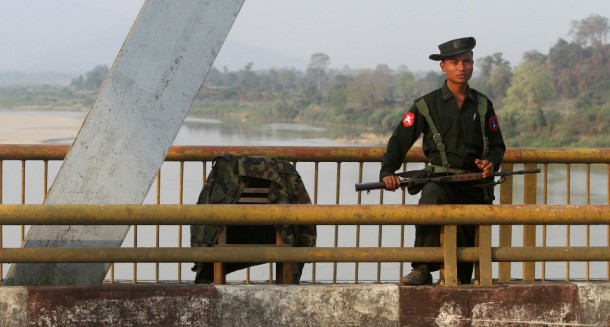The Kachin Independence Organization (KIO) has rejected an invitation from Burma’s government to hold peace talks in Naypyidaw, saying it would be “impossible” to meet in the country’s capital while its own headquarters remains under siege.
“We have already informed them [the government] that it is impossible to hold peace talks in a government-controlled area as long as this situation continues,” said KIO spokesperson La Nan, referring to fighting near Laiza, where the group is based.
On Aug. 25, Aung Min, a minister from the President’s Office and the government’s chief negotiator in talks with the country’s ethnic armed groups, sent a letter to the KIO leadership inviting them to hold another round of talks in Naypyidaw.
“He [Aung Min] knew we would not come, but he kept telling the media about the offer so that everyone would wonder why we rejected it,” La Nan told The Irrawaddy on Wednesday. Both the KIO and the government had previously rejected calls to hold talks in their respective territories.
La Nan also said that although Aung Min implied the offer had come directly from President Thein Sein, the KIO has yet to receive an invitation from the president.
In a recent interview with The Irrawaddy, Aung Min said that while he was willing to meet with the KIO anywhere, Deputy Commander-in-Chief of the Armed Forces Gen. Soe Win, who accompanies him during his negotiations with armed groups, does not have that freedom.
“I am the ‘minister without borders,’ so I go wherever I want,” said Aung Min. “However, Gen. Soe Win cannot do as I do. He can’t even go to the other side of the border.”
He added that the KIO had asked him to withdraw 40 units of the Burmese army from the group’s territory. He said he conveyed the request to the relevant military commanders, but explained that it was not in his power to tell the army what to do, as he has no control over military matters.
Aung Min said he earlier proposed that the next round of talks be held in Kachin State’s Bhamo Township, while the KIO suggested Loijay, a township closer to KIO-controlled territory. Another possible location, he said, was Muse in Shan State. All of these proposals were rejected.
Meanwhile, on Tuesday the KIO and Kachin peace brokers close to the Burmese government opened a “justice and negotiation center” in Prang Ngawn, a village in Loijay Township. The center will be used not only for future negotiations, but also as a place where “anyone can come and give advice” about the peace process, said La Nan.
“We will store all our records about the peace talks at the center and anyone who is interested can come and see them. This will enable people to read the details about the peace talks, since until now their only source of information has been the media, which does not tell the whole story,” said La Nan.
Also on Tuesday, more than 30 religious leaders in Hpakant, Kachin State, sent letters to KIO leaders and President Thein Sein urging them to end the fighting, which has displaced some 65,000 people since it began last June, ending a 17-year-old ceasefire.
Hpakant is famous as the center of Burma’s jade-mining industry. Over the past month, it has been the scene of intense clashes between Burmese and Kachin troops amid a buildup of government army forces.

















